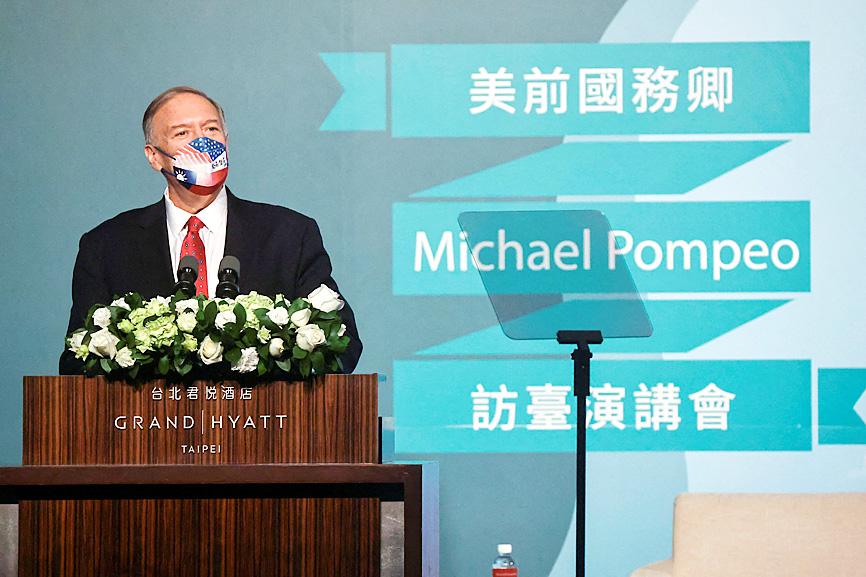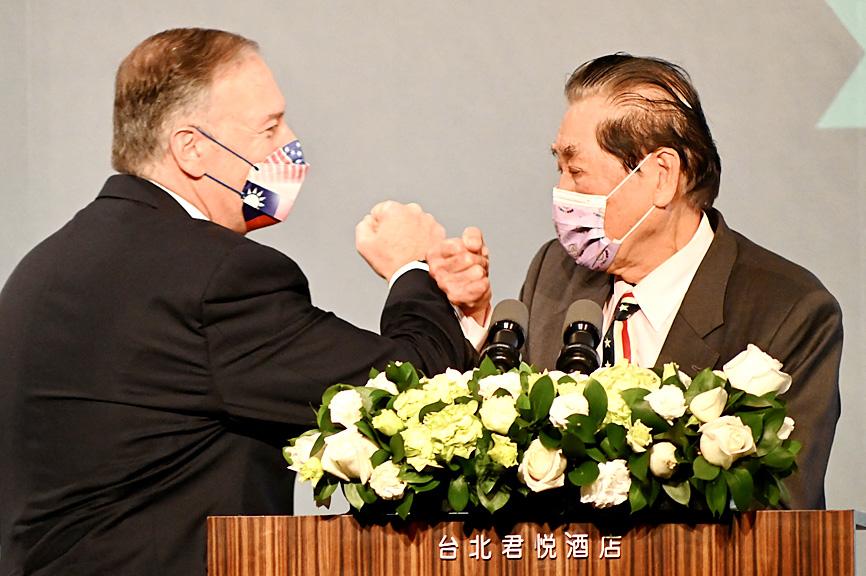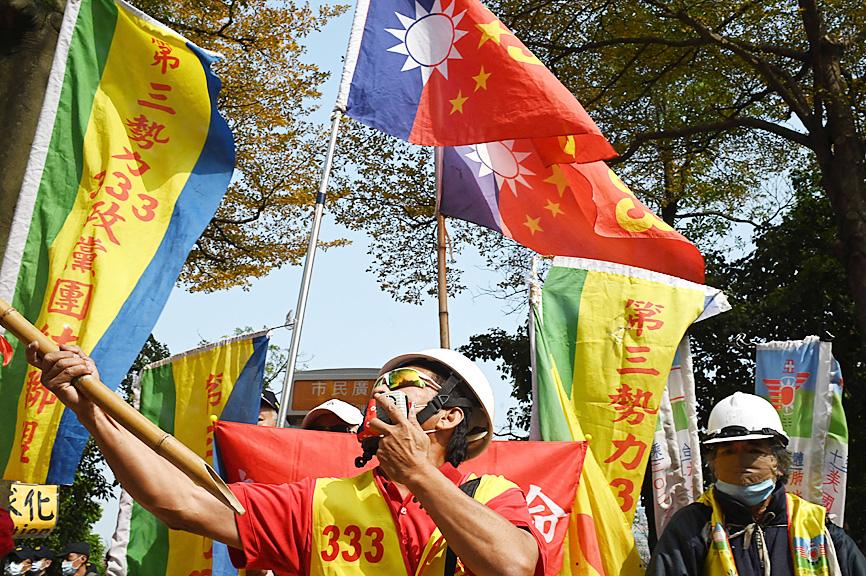Officially recognizing the Republic of China’s (ROC) sovereignty is “easy” and “the right thing to do,” former US secretary of state Mike Pompeo said yesterday in an interview with the Taipei Times in Taipei.
“It’s easy to do. It’s the right thing to do. It’s the morally proper thing to do. It’s not hard,” said Pompeo, who served from April 2018 to January last year under the administration of former US president Donald Trump.
“I think the moment calls for clarity, transparency and a deep recognition of the central idea that we’ve all known: that Taiwan is not a part of China,” he added, joking that the nation’s issuance of a visa for him to visit illustrates “its enormous independence from mainland China.”

Photo: Ann Wang, Reuters
In a speech earlier in the day, Pompeo made the same assertion that the US should offer Taiwan diplomatic recognition as a “free and sovereign country,” urging the US to move away from its long-time policy of “strategic ambiguity.”
“Today I come here as a private citizen, but it is an imperative to change 50 years of ambiguity. It is about America’s diplomatic recognition of the Republic of China, while the US should continue to engage the People’s Republic of China as a sovereign government,” Pompeo said at an event organized by the government-affiliated Prospect Foundation think tank.
“America’s diplomatic recognition of 23 million freedom-loving Taiwanese people, its legal, democratically elected government can no longer be ignored, avoided or treated as secondary,” he said.

Photo: Sam Yeh, AFP
“It is my view that the US government should immediately take necessary and long-overdue steps to do the right and obvious thing, that is, to offer the Republic of China America’s diplomatic recognition as a free and sovereign country,” he said.
“This is not about Taiwan’s future independence. It is about a recognition of an unmistakable, already existent reality,” he said. “There is no need for Taiwan to declare independence because it is already an independent nation. Its name is the Republic of China. The people and government of the United States should simply accept this fundamentally decent, morally right thing. Taiwanese people deserve the world’s respect for continuing down this free, democratic and sovereign path.”
The Ministry of Foreign Affairs yesterday declined to comment on Pompeo’s remarks, saying only that it respected his comments.

Photo: Sam Yeh, AFP
Taiwan-US relations have grown steadily over the past few years with bipartisan support in Washington, providing a solid foundation for Taipei to expand cooperation and partnerships between the countries across various domains, it said in a statement.
At a news conference hosted by Prospect Foundation executive director Lai I-chung (賴怡忠), Pompeo was asked to assess the likelihood of China invading Taiwan.
The level of risk across the Taiwan Strait cannot be assessed separately from Washington’s willingness to provide arms and training, or Taipei’s willingness to pay for them, Pompeo said.
“It turns on the willingness of the Western world to demonstrate that the cost for [Chinese President] Xi Jinping (習近平) engaging in that kind of activity are just too high,” he said.
Regarding whether he would run for US president in 2024, Pompeo said that he did “not know what will happen in 2023 or 2024,” but would continue on the “mission to protect democracy and freedom” in the US and around the world.
“We need to defend human dignity and sovereignty, and we need to draw this line between tyranny and democracy so cleanly and so crisply that we can preserve it for the next generation,” he said.
Asked about the purpose of his Taiwan visit, Pompeo said that he wanted to thank Taiwanese for being a good friend and partner of the US during his tenure as the US secretary of state, director of the CIA and senator.
“I wanted to come here because the people of Taiwan are so deeply wonderful and loving of the central ideas that we have in the American founding as well, this idea that liberty matters ... that freedom of speech matters,” he said.
Pompeo, who is visiting Taiwan for the first time, is due to leave today.
The visit follows a 30-hour stopover by a delegation of former US security officials sent by US President Joe Biden to assure Taiwan of the US’ commitment in light of Russia’s invasion of Ukraine.

INVESTIGATION: The case is the latest instance of a DPP figure being implicated in an espionage network accused of allegedly leaking information to Chinese intelligence Democratic Progressive Party (DPP) member Ho Jen-chieh (何仁傑) was detained and held incommunicado yesterday on suspicion of spying for China during his tenure as assistant to then-minister of foreign affairs Joseph Wu (吳釗燮). The Taipei District Prosecutors’ Office said Ho was implicated during its investigation into alleged spying activities by former Presidential Office consultant Wu Shang-yu (吳尚雨). Prosecutors said there is reason to believe Ho breached the National Security Act (國家安全法) by leaking classified Ministry of Foreign Affairs information to Chinese intelligence. Following interrogation, prosecutors petitioned the Taipei District Court to detain Ho, citing concerns over potential collusion or tampering of evidence. The

‘FORM OF PROTEST’: The German Institute Taipei said it was ‘shocked’ to see Nazi symbolism used in connection with political aims as it condemned the incident Sung Chien-liang (宋建樑), who led efforts to recall Democratic Progressive Party (DPP) Legislator Lee Kun-cheng (李坤城), was released on bail of NT$80,000 yesterday amid an outcry over a Nazi armband he wore to questioning the night before. Sung arrived at the New Taipei City District Prosecutors’ Office for questioning in a recall petition forgery case on Tuesday night wearing a red armband bearing a swastika, carrying a copy of Adolf Hitler’s Mein Kampf and giving a Nazi salute. Sung left the building at 1:15am without the armband and apparently covering the book with a coat. This is a serious international scandal and Chinese

Seventy percent of middle and elementary schools now conduct English classes entirely in English, the Ministry of Education said, as it encourages schools nationwide to adopt this practice Minister of Education (MOE) Cheng Ying-yao (鄭英耀) is scheduled to present a report on the government’s bilingual education policy to the Legislative Yuan’s Education and Culture Committee today. The report would outline strategies aimed at expanding access to education, reducing regional disparities and improving talent cultivation. Implementation of bilingual education policies has varied across local governments, occasionally drawing public criticism. For example, some schools have required teachers of non-English subjects to pass English proficiency

NEGOTIATIONS: The US response to the countermeasures and plans Taiwan presented has been positive, including boosting procurement and investment, the president said Taiwan is included in the first group for trade negotiations with the US, President William Lai (賴清德) said yesterday, as he seeks to shield Taiwanese exporters from a 32 percent tariff. In Washington, US Trade Representative Jamieson Greer said in an interview on Fox News on Thursday that he would speak to his Taiwanese and Israeli counterparts yesterday about tariffs after holding a long discussion with the Vietnamese earlier. US President Donald Trump on Wednesday postponed punishing levies on multiple trade partners, including Taiwan, for three months after trillions of US dollars were wiped off global markets. He has maintained a 10 percent